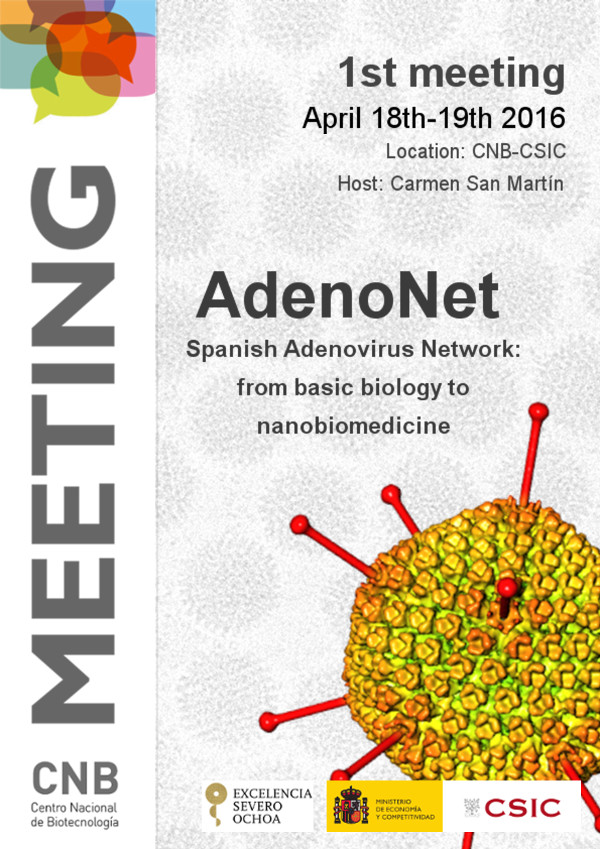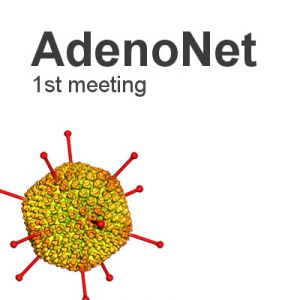Adenoviruses are a family of viruses that can infect various human tissues such as the respiratory or gastrointestinal tracts. But in addition to their pathogenic nature, they have important applications in gene therapy and cancer virotherapy.
Spanish researchers will meet at the Centro Nacional de Biotecnología of the CSIC (CNB-CSIC) on 18 and 19 April to exchange ideas and share their results on the functions and the possibilities offered by these viruses.
The conference is organized by the Spanish Network of Adenovirus (AdenoNet), coordinated by Carmen San Martín of the CNB-CSIC.
"These viruses are extremely interesting because of their dual relationship with humans,” explains the researcher. “On the one hand they are pathogenic and can cause serious health problems in immunosuppressed patients. But at the same time, we can modify them to act as "biomedicines" in some diseases, which is already being tested in cancer therapies or vaccines." According to San Martín, this first conference organized by the network is intended to be a meeting point for the analysis of all these facets of the virus.
Throughout the morning of Monday the 18th, San Martín and Mark van Raaij (CNB-CSIC) will cover topics on the basic biology and molecular structure of the virus and its mechanism of interaction with the cell. In the afternoon, several scientists will address the clinical implications and pathogenicity of various strains, as well as their potential as a platform for the development of vaccines against animal diseases.
On Tuesday the 19th, the conference will focus on strategies that allow these viruses to be used in gene therapy, with presentations by Rubén Hernández Alcoceba (Center for Applied Medical Research) and Miguel Chillón (Autonomous University of Barcelona).
To conclude the conference, researchers Ramón Alemany (IDIBELL), Cristina Fillat (IDIBAPS) and Marta Alonso (University of Navarre) will explain their lines of work in the search for possibilities in virotherapy for pancreatic cancer or brain tumors.
About AdenoNet
ADENONET was founded in 2015 to act as a networking platform for Spanish research groups that study adenovirus. The work of these groups ranges from detecting the virus in nature to its clinical impact and uses in virotherapy, as well as the architecture of the viral particle, its assembly, and its interaction with the host.
The intention of the network is to promote collaboration among its members to promote the development of new antiviral treatments, gene transfer therapies, vaccines, oncolysis, and biomedical imaging.
The network includes groups that are internationally recognized for their work with these viruses. Among them is that led by the network coordinator Carmen San Martín, which centres on structural studies of the virus, that of Ramon Alemany (IDIBELL), which works on application of oncolytic viruses against tumors; Marta Alonso’s group (University of Navarre) seeks to apply the properties of adenoviruses to brain tumors in children and adults, and Rosina Gironés (University of Barcelona), who focuses research on adenovirus-contaminated environmental media that can pose a health risk.
 PROGRAMME
PROGRAMME
Monday, 18 April
11:00-11:45 Carmen San Martín (Centro Nacional de Biotecnología, CNB-CSIC)
Structural and Physical Determinants of Adenovirus Assembly
11:45-12:15 BREAK
12:15-13:00 Mark van Raaij (Centro Nacional de Biotecnología, CNB-CSIC)
Crystallographic Structures of Animal Adenovirus Capsid Proteins
13:00-13:45 Rosina Girones (Universidad de Barcelona)
Adenoviruses Contaminants In The Environment, Water And Food
13:45-15:30 LUNCH
15:30-16:15 Javier Sánchez Céspedes (Instituto de Biomedicina de Sevilla)
Adenovirus Infections In Immunosuppressed Patients: Epidemiology, Immune Response And Development Of New Therapeutic Alternatives
16:15-17:00 Verónica Martín (Instituto Nacional de Investigación y Tecnología Agraria y Alimentaria, INIA)
Recombinant adenovirus as control strategies for animal diseases
17:00-17:45 Pilar Martín Duque (Universidad Francisco de Vitoria & Instituto de Investigación Sanitaria de Aragón)
Nanoparticle modification of adenoviruses for CAR-negative cells infection
Thursday, 19 April
9:30-10:15 Rubén Hernández Alcoceba (Centro de Investigación Médica Aplicada, CIMA)
Gene Therapy using High-Capacity Adenoviral Vectors
10:15-11:00 Miguel Chillón (Universidad Autónoma de Barcelona)
In Vitro And In Vivo Characterization Of An Adenovirus Chimeric Ad5/52s Gene Therapy Vector
11:00-11:45 BREAK
11:45-12:30 Ramón Alemany (Institut d'Investigació Biomèdica de Bellvitge, IDIBELL)
Oncolytic Adenoviruses for Cancer Virotherapy
12:30-13:15 Cristina Fillat (Institut d'Investigacions Biomèdiques August Pi i Sunyer)
Engineering Oncolytic Adenovirus for Pancreatic Ductal Adenocarcinoma
13:15-15:00 COMIDA
15:00-15:45 Marta Alonso (Universidad de Navarra)
Oncolytic Adenovirus for the Treatment of Adult and Pediatric Brain Tumors






